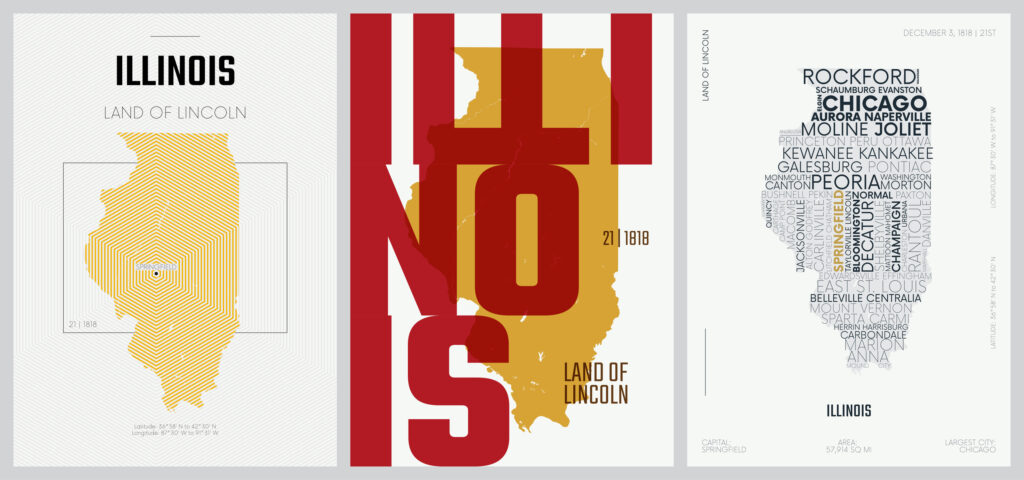
Illinois is often described as the “Land of Lincoln,” but beyond its history and politics, the state is a vibrant mosaic of cultures and languages. From Chicago to the small towns dotting the prairies, Illinois reflects the story of America itself, diverse, dynamic, and deeply interconnected.
A State Shaped by Migration
Illinois has long been a hub for migration and immigration. In the 19th and 20th centuries, waves of European immigrants, Irish, German, Polish, Italian, and others, arrived to work in Chicago’s factories and stockyards. Later, the Great Migration brought hundreds of thousands of African Americans from the South to Chicago, shaping the city’s music, food, and literature. Today, Illinois continues to welcome communities from across the globe. Immigrants from Mexico, India, China, the Philippines, Nigeria, and many other countries have enriched the state’s cultural landscape. Each group carries with it traditions, languages, and perspectives that contribute to the unique character of Illinois. English is the dominant language in Illinois, but it’s far from the only one spoken. According to recent census data, nearly 23% of Illinois residents speak a language other than English at home. Spanish leads the way, particularly in Chicago and central Illinois, but other widely spoken languages include:
– Polish – Reflecting Chicago’s long-standing Polish community, one of the largest outside Warsaw.
– Arabic – With growing Middle Eastern communities across the state.
– Tagalog and other Filipino languages -Representing Illinois’ strong Filipino-American presence.
– Chinese – Spoken in both Chinese and Taiwanese communities.
– Gujarati, Hindi, and Urdu – Reflecting South Asian immigration.
This diversity of languages not only adds richness to daily life, from neighborhood festivals to cuisine, but also underscores the importance of language access in healthcare, education, business, and government.
Why Language Access Matters in Illinois
With such cultural and linguistic diversity, language access is essential. Whether it’s a patient receiving care, a parent attending a school meeting, or a business expanding globally, accurate interpretation and translation ensure clear communication and equal opportunity. Language services connect communities. They allow Illinois’ residents, no matter what language they speak, to fully participate in civic life, access critical resources, and preserve the multicultural fabric that makes the state so unique.
Language access is more than a convenience, it’s a matter of equity, safety, and inclusion. In a state as linguistically diverse as Illinois, ensuring that residents can communicate in their preferred language has a direct impact on their well-being and ability to thrive.
Healthcare
Clear communication between patients and providers can be a matter of life and death. Studies show that patients with limited English proficiency (LEP) are more likely to experience misdiagnoses, medication errors, and poorer health outcomes when interpretation isn’t available. In Illinois, where large Spanish- speaking, Arabic-speaking, and Asian-language-speaking communities rely on healthcare systems, professional medical interpretation ensures patients understand their treatment plans and providers deliver safe, effective care.
Illinois linguistic diversity is vibrant, and nowhere is this more visible than in communities like Melrose Park, Berwyn, Burr Ridge, and Maywood. These areas bring together Spanish-speaking families, Polish and Arabic speakers, and many others who rely on interpreters to navigate healthcare settings. At Acutrans, we value the professionals who make these connections possible, and we welcome interpreters who want to be part of this effort across the Chicago area.
Education
Language access is vital in schools, where parents and guardians need to be active participants in their children’s learning. Translation of report cards, notices, and individualized education programs (IEPs), along with interpretation at parent-teacher conferences, allows immigrant families to stay engaged in education. In Illinois, home to one of the largest bilingual student populations in the U.S., this support helps bridge generational and cultural gaps.
Government and Civic Life
From voting information to public safety alerts, access to information in multiple languages ensures that all residents can exercise their rights and responsibilities. Without translation and interpretation, many Illinois residents would be excluded from essential services, emergency resources, or community participation.
Business and Economic Growth
Illinois is a global hub, especially Chicago, which hosts major financial institutions, manufacturers, and tech companies. Businesses that invest in multilingual communication not only serve local communities better but also expand their reach internationally. Translation and localization services open doors to global markets, build trust with diverse customers, and strengthen brand reputation and this has been Acutrans lighthouse since its inception.
Building Inclusive Communities
At its core, language access is about belonging. When people can communicate in their preferred language, they feel seen, respected, and included. This strengthens community bonds, fosters cultural exchange, and enriches the shared identity of Illinois.
Illinois is more than its landmarks and history; it’s a living example of how cultures and languages come together to shape a state’s identity. For language service providers, Illinois is both a challenge and an opportunity: a place where professional interpretation and translation aren’t just services, but essential tools for building understanding and inclusivity.
